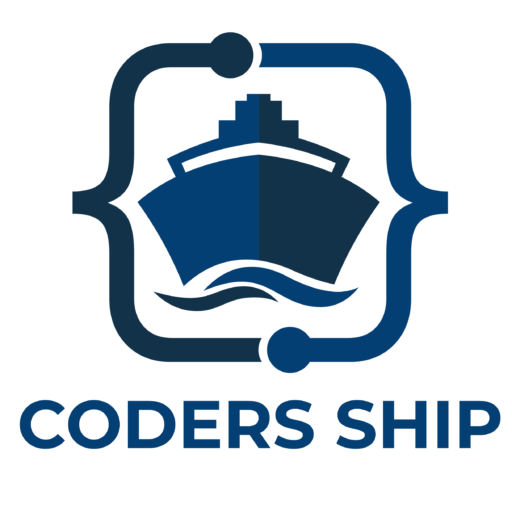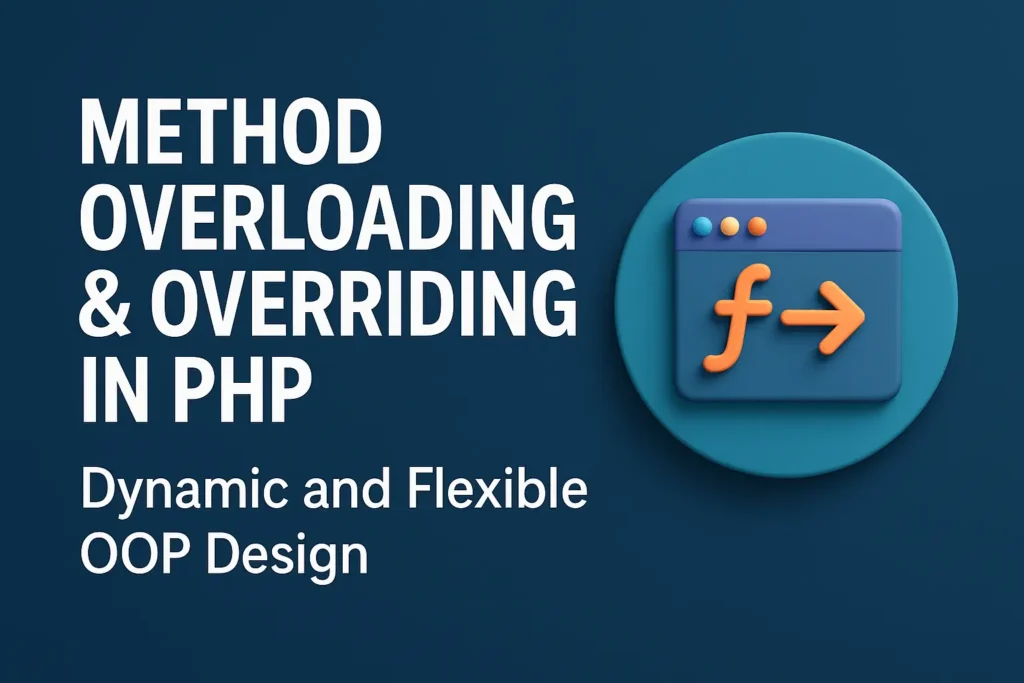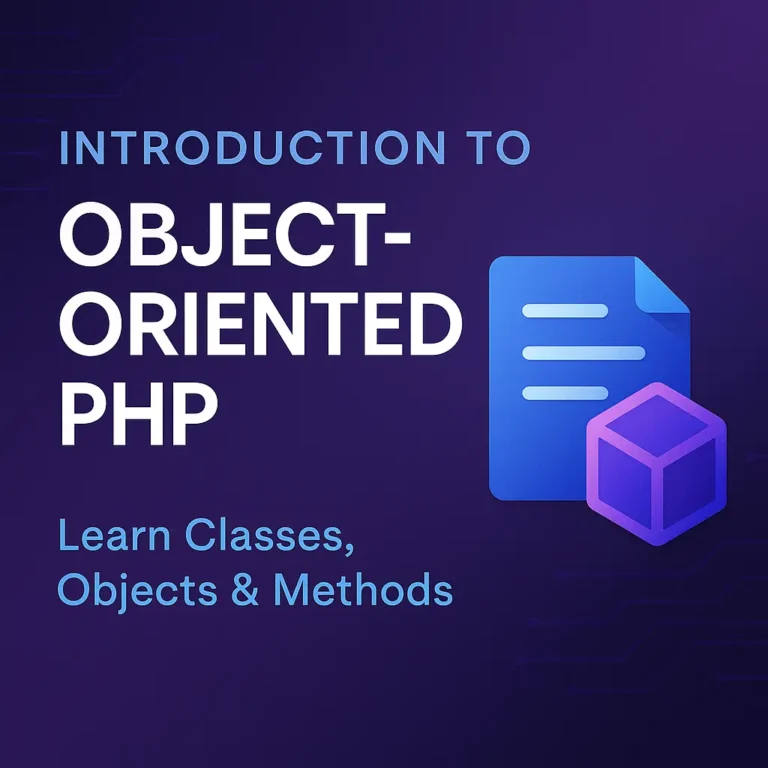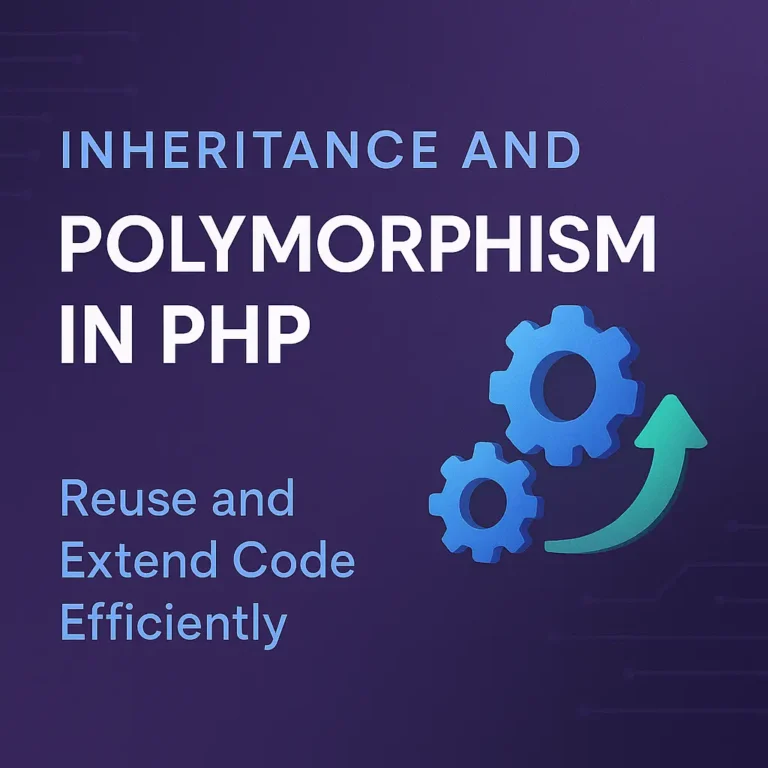In this article, we will delve into method overloading and overriding in PHP, explaining how they work, and providing code examples to illustrate their usage.
Overloading Methods
Method overloading in PHP refers to the ability to dynamically create properties and methods. Unlike some other languages like Java, PHP does not support method overloading by default. However, PHP offers the __call() and __callStatic() magic methods which allow us to implement similar functionality.
Using __call and __callStatic
The __call method is invoked when an inaccessible or non-existent method is called on an object. Similarly, __callStatic is triggered for inaccessible or non-existent static methods.
Here’s an example demonstrating how to use __call and __callStatic:
class OverloadingExample {
// Handle dynamic instance method calls
public function __call($name, $arguments) {
echo "Calling method '$name' with arguments: " . implode(', ', $arguments) . "\n";
}
// Handle dynamic static method calls
public static function __callStatic($name, $arguments) {
echo "Calling static method '$name' with arguments: " . implode(', ', $arguments) . "\n";
}
}
$obj = new OverloadingExample();
// Dynamic instance method calls
$obj->testMethod('arg1', 'arg2');
// Dynamic static method calls
OverloadingExample::staticTestMethod('arg1', 'arg2');
Output:
Calling method 'testMethod' with arguments: arg1, arg2
Calling static method 'staticTestMethod' with arguments: arg1, arg2
In the example above, when testMethod and staticTestMethod are called, PHP checks if these methods exist. Since they do not, the __call and __callStatic methods are invoked, respectively.
Practical Example: Dynamic Getter and Setter
A practical use case for method overloading is implementing dynamic getters and setters.
class DynamicProperties {
private $data = [];
// Getter and Setter for instance methods
public function __call($name, $arguments) {
if (substr($name, 0, 3) == 'get') {
$property = strtolower(substr($name, 3));
return $this->data[$property] ?? null;
}
if (substr($name, 0, 3) == 'set') {
$property = strtolower(substr($name, 3));
$this->data[$property] = $arguments[0];
return;
}
throw new BadMethodCallException("Method $name does not exist");
}
}
$dynamic = new DynamicProperties();
$dynamic->setName('John Doe');
echo $dynamic->getName(); // Output: John Doe
In this example, the __call method intercepts calls to setName and getName, allowing us to dynamically manage object properties without explicitly defining these methods.
Overriding Methods
Method overriding in PHP occurs when a child class provides a specific implementation for a method already defined in its parent class. This allows the child class to alter or extend the behavior of the parent class’s method.
Basic Example of Overriding
Here’s a simple example to illustrate method overriding:
class ParentClass {
public function greet() {
echo "Hello from the parent class!\n";
}
}
class ChildClass extends ParentClass {
public function greet() {
echo "Hello from the child class!\n";
}
}
$parent = new ParentClass();
$child = new ChildClass();
$parent->greet(); // Output: Hello from the parent class!
$child->greet(); // Output: Hello from the child class!
In this example, the greet method in ChildClass overrides the greet method in ParentClass. When greet is called on an instance of ChildClass, the overridden method is executed.
Using Parent Method in Overridden Method
Sometimes, it is useful to call the parent class’s method within the overridden method in the child class. This can be achieved using the parent keyword.
class ParentClass {
public function greet() {
echo "Hello from the parent class!\n";
}
}
class ChildClass extends ParentClass {
public function greet() {
parent::greet();
echo "Hello from the child class!\n";
}
}
$child = new ChildClass();
$child->greet();
Output:
Hello from the parent class!
Hello from the child class!
In this example, the greet method in ChildClass first calls the greet method from ParentClass before adding its own behavior.
Abstract Classes and Method Overriding
Abstract classes provide a way to enforce method overriding. An abstract class can define abstract methods that must be implemented by any concrete subclass.
abstract class Animal {
abstract public function makeSound();
}
class Dog extends Animal {
public function makeSound() {
echo "Bark\n";
}
}
class Cat extends Animal {
public function makeSound() {
echo "Meow\n";
}
}
$dog = new Dog();
$cat = new Cat();
$dog->makeSound(); // Output: Bark
$cat->makeSound(); // Output: Meow
In this example, the Animal class defines an abstract method makeSound. Both Dog and Cat classes override this method, providing their own implementations.
Final Keyword in Method Overriding
PHP allows you to prevent method overriding by using the final keyword. A method declared as final cannot be overridden by any subclass.
class ParentClass {
final public function greet() {
echo "Hello from the parent class!\n";
}
}
class ChildClass extends ParentClass {
// This will cause an error
public function greet() {
echo "Hello from the child class!\n";
}
}
$child = new ChildClass();
$child->greet();
This code will result in a fatal error because greet in ParentClass is declared as final and cannot be overridden in ChildClass.
Conclusion
Method overloading and overriding are powerful features in PHP that enable dynamic and polymorphic behavior in your applications. While PHP does not support method overloading in the traditional sense, the __call and __callStatic magic methods provide a flexible alternative. Method overriding, on the other hand, is fully supported and allows subclasses to alter or extend the behavior of inherited methods.






